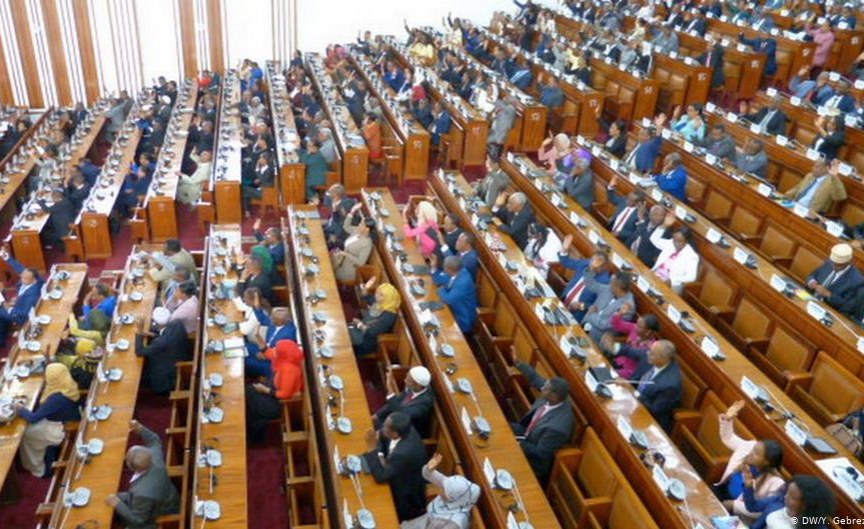Addis Ababa – On Thursday, April 17, a representative from the People’s House approved an amendment to Ethiopia’s mass media declaration and granted the Prime Minister the authority to nominate the Director of the Ethiopian Media Authority (EMA), a role previously reserved for the House.
The amendment to Declaration No. 1238/2021 has been reviewed by the Standing Committee on Democracy since its introduction by the House of Representatives on October 29, 2024.
The approved amendment abolishes Article 8(2) of the declaration previously stated by the Director of EMA, the Ethiopian media regulator, that it was “appointed by representatives of the people.” Under the revised law, the Director General will be appointed Prime Minister in return and appointed by the House of Representatives.
Additionally, Articles 9 (1) and 9 (2) will be abolished. This required appointing board members “in an open and transparent way,” providing an opportunity to “nominate and share candidate opinions,” and outline “nomination and share candidate opinions,” including “disclosing the candidate and candidate selection process through the media and other electronic means.”
Furthermore, Article 11(6) which provided that board members are not “party members or employees” has been removed.
This amendment further abolishes Article 9 (5) (a). This required the board to include two members each from civil society organisations, the media and “other agencies related to the media sector.” The new provisions broadly state that the Board will consist of “representatives of various media-related bodies” without specifying expressions from a particular sector.
This amendment also transfers media licensing and regulatory authority – including the authority to refuse to register a license, or update, suspend, revoke, warnings, fines, and termination from the board of directors from the committee.
EMA authorities believe that the proposed amendments represent a critical restructuring of the authorities’ governance, focusing on addressing years of bureaucratic inefficiency and clarifying their institutional role. They also argue that while the EMA remains under Congressional supervision, the amendment will practically adjust the governance model in line with statutory status and operational reality.
However, this amendment faced significant opposition from journalists, media organizations and civil society groups in Ethiopia and abroad.
In November 2024, a coalition of 14 media associations and civil society organisations raised concerns about the proposed changes and warned that the amendment would place the EMA “under the influence of the enforcer.”
The Ethiopian Association of Mass Media Professionals (EMMA), Ethiopian Media Women’s Association (EMWA), Ethiopian Human Rights Council (EHRCO), and the Centre for Progress in Rights and Democracy (card), criticised the “equale stakeholder argument” for its implementation “without independent research.”
The International Press (IPI) also denounced the amendment, warning of the risks posed to media freedom. IPI urged lawmakers to “reject proposed amendments to take measures to undermine the independence of media regulators.”
“Independent regulatory bodies are essential to freedom of the press. Therefore, governments need to ensure the independence of media regulatory bodies in line with their commitment to protecting freedom of expression and media, based on the Civil Rights of the African Charter on the Rights of Humans and People and Article 9 of Article 9.
The revision of the Media Act comes amid growing concern over what observers describe as an unprecedented deterioration of Ethiopian press freedom.
In the 2024 Global Press Freedom Index, Borderless Reporters (RSF) ranked Ethiopia at 141st out of 180 countries. We dropped 10 locations since 2023. “The RSF has been devastated by inter-ethnic conflicts and civil wars, and much of the recent benefits of press freedom have been restored.”
Sign up for the AllAfrica newsletter for free
Get the latest African news
success!
Almost finished…
You need to check your email address.
Follow the instructions in the email you sent to complete the process.
error!
There was a problem processing the submission. Please try again later.
The Committee to Protect Journalists (CPJs) ranked Ethiopia among the worst journalist guards in sub-Saharan Africa, ranking third after Eritrea and Egypt. In the 2024 prison census, CPJ recorded six journalists detained in Ethiopia, five of whom faced “terrorism” charges. The organization said authorities often use “ambiguous accusations or convictions of terrorism or extremism” to jail journalists.
According to a journalist safety assessment report by International Media Support (IMS), reporters’ freedom is “increasingly threatened” as it faces “threatening, detention and harassment.” The report said at least 43 Ethiopian journalists were arrested, imprisoned or tempted in 2024.

